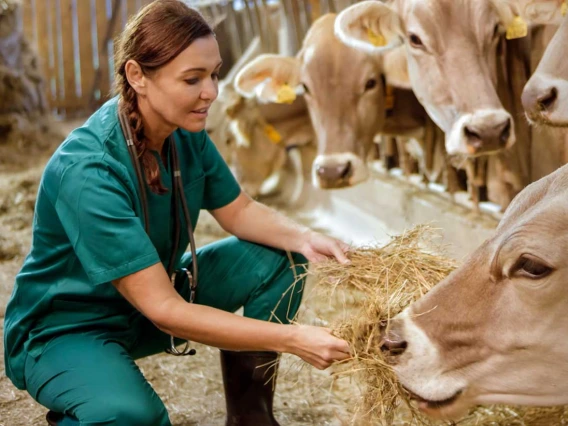Insights into Healthy Aging: Promoting Healthy Minds, Brains & Lives
Undergraduate Certificate
Quick Facts

Top 1%
of all Higher-Ed
Institutions
- Center for World University Rankings, 2024
#1
In Best Value Among
Arizona's Public Universities
- Payscale, 2024
The size of the baby boomer generation — born between 1945 and 1965 — is reshaping America's older population. Due to this dramatic shift, there is a growing need for skilled workers knowledgeable about the aging process.
The Insights into Healthy Aging Undergraduate Certificate program provides you with an in-depth understanding of the dynamic dimensions of the aging process. This certificate focuses on approaching aging biologically, psychologically and socially in the context of the individual and society.
Experts in gerontology will guide you as you develop a deeper understanding of how aging impacts the health, well-being, and quality of life of older adults. In this program, you will learn to identify myths that perpetuate erroneous stereotypes of older adults and engage with individuals of the aging population. You will utilize gerontological frameworks to examine human development and aging. You will learn to relate psychological, biological, and social theories to understanding longevity, adaptation, heterogeneity, inequality, stability, and changes in aging.
You will also learn to identify practical solutions to enhance the quality of life for older adults and their caregivers and collaboratively engage with others to promote integrated approaches to aging. The diversity of course options offered in this program demonstrates a robust and invaluable multidisciplinary educational experience.
The Insights into Healthy Aging certificate program is offered through the Psychology Department, open to all majors, and designed to provide a hands-on approach to learning about and interacting with older adults.
Additionally, you will learn critical skills desired by employers, beneficial in a wide range of careers, industries, and post-graduate studies in gerontology, psychology, medicine, and more.
This certificate can be completed 100% online. Some partner departments may offer in-person courses that can be taken as part of the fulfillment of certificate requirements, however, in-person courses are not required.
*Residents of some U.S. Territories may not be eligible. Please see our Eligibility & State Authorization page for more information.
The certificate requires completion of PSY 324: Fundaments of Aging, and three additional courses. See a list of possible course options below:
This course focuses on dementia and other conditions that commonly compromise cognition and memory in older adults, how these disorders impact daily functioning and the warning signs that an individual may need additional care.
In this course, you will discuss social and cultural influences on aging through various relationships including social supports, sexuality and family, as well as the impact of an increasingly older population on society.
This course will serve as a broad introduction to the many ethical issues present in the care of older persons. We will examine the topic from a psychological perspective, raising questions about autonomy, rights, obligations, and standards of care. Students will be challenged to critically examine the ethical challenges presented in a diverse array of topics, from financial planning to maltreatment and institutionalization to end-of-life care. Throughout the course we will integrate law, policy, and research to develop the tools needed for ethical decision-making in complex situations involving advance directives, maltreatment, institutionalization, end-of-life care, and more.
You will cover basic concepts in the therapeutic care of aging adults, with an emphasis on self-care and stress-management for older adults, professional caregivers, and family caregivers. Topics include family communication, managing depression and stress and coping with death and loss.
This course is designed for upper-level undergraduates, covering theories of aging, the assessment of normal and pathological brain aging, and age-related cognitive and psychological changes. The course focuses on clinical assessments of healthy and pathological aging and prevention measures to reduce the risk of disease and disorders to improve lifestyle and psychological well-being to promote aging well. Students will also have the opportunity to apply course-related material to real-world experiences
Explore the change and continuity in the biological, psychological and social processes associated with adulthood, with an emphasis on late life. In this course, you will have the opportunity to engage older adults in conversation, and experience first-hand the broad range of individual differences that occur with aging.
This course will provide students with an overview of the trends in mental health and aging, mental health issues, mental wellness, and resilience as it relates to older adults. Looking through a culturally competent lens, this course focuses on common mental health conditions, substance use, suicide, and promoting mental wellness and resilience among older adults. Students will have the opportunity to review evidence-based strategies, therapies and services, and relate the literature to real-world experiences.
Outcomes
Skills
Earning your Undergraduate Certificate in Insights into Healthy Aging: Promoting Healthy Minds, Brains & Lives will build core skills, including:
- Knowledge of the aging process
- Advocating for older persons
- Ethical & social responsibility
- Inclusivity and diversity
- Teamwork/collaboration
- Leadership
- Global & intercultural fluency
- Critical thinking
- Promoting mental health
- Promoting well being
- Problem solving
Potential Career Paths
Graduates of the Insights Into Healthy Aging Undergraduate Certificate program will be prepared to pursue careers in the following fields:











